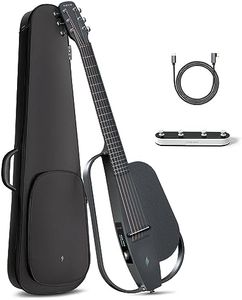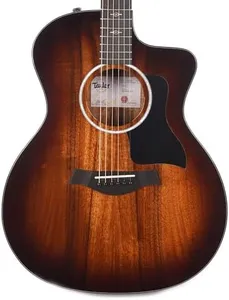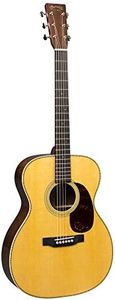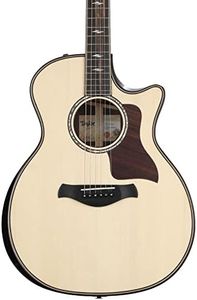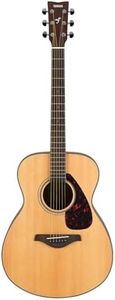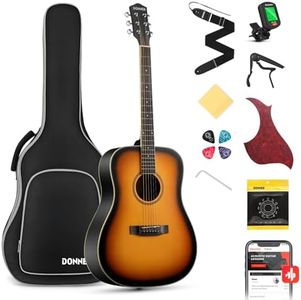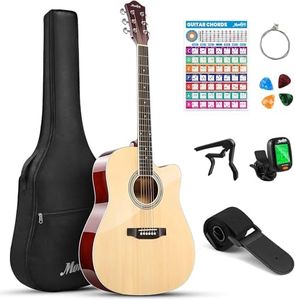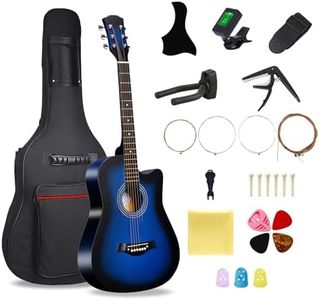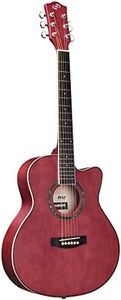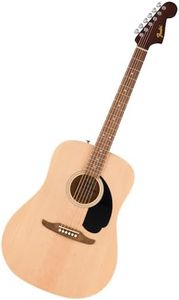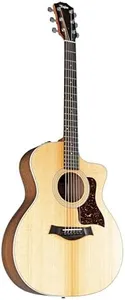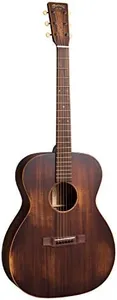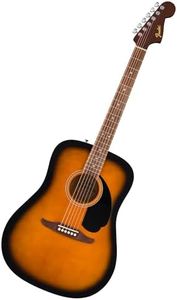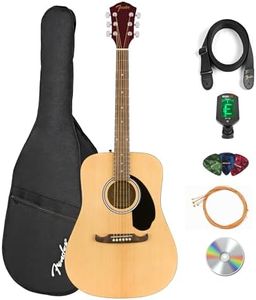10 Best Acoustic Guitars 2026 in the United States
Our technology thoroughly searches through the online shopping world, reviewing hundreds of sites. We then process and analyze this information, updating in real-time to bring you the latest top-rated products. This way, you always get the best and most current options available.

Our Top Picks
Winner
Gibson Gibson Acoustic J-45 Standard 2019, Vintage Sunburst
Most important from
4 reviews
The Gibson Acoustic J-45 Standard 2019 is a well-regarded acoustic guitar known for its rich and warm sound, largely thanks to its quality tonewoods. The guitar features a Sitka spruce top, which is popular for its bright and clear tonal quality, paired with rosewood and mahogany for the back and sides, adding depth and warmth to the sound. This combination is ideal for players looking for a versatile guitar suitable for various music styles, especially folk and blues.
The guitar traditionally features a round-shoulder dreadnought body shape, offering a full and balanced tone with good projection. Its neck is made from mahogany, known for durability and comfort, and the fretboard is rosewood, providing a smooth playing surface. The fixed bridge system ensures tuning stability and easy maintenance.
Finished in a Vintage Sunburst, the guitar has a classic and attractive look. It excels in acoustic performance but might require additional equipment for amplified use since there is no indication of built-in electronics.
Most important from
4 reviews
Taylor Taylor 224ce-K DLX Grand Auditorium Acoustic-electric Guitar - Tobacco
Most important from
4 reviews
The Taylor 224ce-K DLX Grand Auditorium Acoustic-electric Guitar is an impressive choice for both beginners and seasoned players who appreciate a rich tonal quality. One of its standout features is the solid Koa top, which contributes to a warm, vibrant sound that can enhance various styles of playing. The layered Koa back and sides offer durability and a beautiful aesthetic, making it visually appealing as well. The mahogany neck provides a smooth playing experience, and the ebony fingerboard adds to the guitar's overall tonal clarity.
In terms of playability, the Grand Auditorium body shape strikes a nice balance between comfort and projection, making it suitable for strumming and fingerstyle alike. The ES2 electronics provide a reliable way to amplify your sound without compromising the guitar's natural tone, which can be a huge plus for performing artists.
There are a few considerations to keep in mind. The price point may be on the higher side for beginners who are just starting and may not yet want to invest heavily in an acoustic guitar. Additionally, while the guitar is well-built, some players might find the weight of 21.8 pounds a bit cumbersome, especially for extended playing sessions. The Taylor 224ce-K DLX is a solid option for those looking for quality craftsmanship and sound in an acoustic-electric guitar, but it may be suited best for intermediate to advanced players or anyone willing to invest in quality.
Most important from
4 reviews
Martin Guitar Standard Series Acoustic Guitars, Hand-Built Martin Guitars with Authentic Wood 000-28 Natural
The Martin Guitar Standard Series Acoustic Guitar 000-28 in Natural finish is a high-quality instrument, ideal for serious players and enthusiasts. The guitar features a 6-string configuration with a spruce top, which is known for delivering a bright and resonant sound. The ebony fingerboard complements the spruce top well, providing smooth playability and durability.
The body of the guitar is crafted from rosewood, known for its rich, warm tones and excellent projection. The combination of rosewood back and sides with mahogany ensures a balanced sound with deep bass and clear highs, making it versatile for various music genres. The neck of the guitar is made from mahogany, providing strength and stability, while the neck profile and scale length are designed for comfortable playability.
The nut width is standard, making finger positioning and chord transitions easier for players of different skill levels. One notable aspect missing from this model is built-in electronics, which means it is purely an acoustic guitar without the capability for direct amplification. This might be a drawback for performers who prefer a built-in pickup or preamp for live performances or recording.
With dimensions of 47 x 20 x 9 inches and a weight of 17.6 pounds, the guitar is relatively easy to handle, though some may find it slightly heavy. This Martin 000-28 model is best suited for dedicated acoustic guitar players who value craftsmanship and rich, authentic tones in their instruments.
